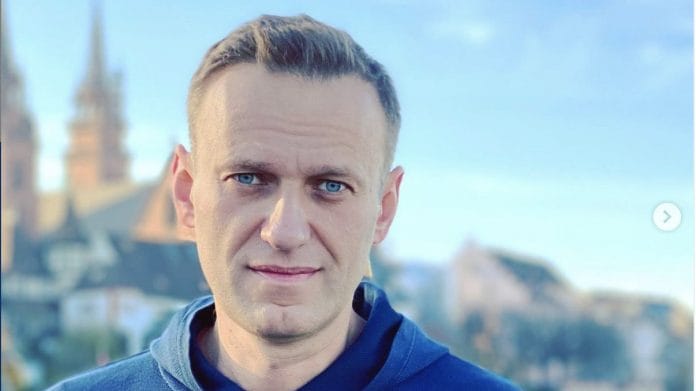Vladimir Putin’s most troublesome critic is coming back. Alexey Navalny says he will return home to Moscow on Sunday, almost five months after a nerve-agent attack that left him fighting for his life and forced a dramatic air evacuation to Germany.
It’s a headache for the Kremlin, where officials had surely hoped the 44-year-old anti-corruption activist would take the hint. That’s because whatever they do after his plane touches down at Vnukovo Airport this weekend risks making an irritant worse.
A swift detention, as threatened, would put Navalny out of action, but it would also boost his standing as martyr to the anti-Putin cause — just as he’s revving up a tactical-voting push that could hurt pro-Kremlin candidates standing in September’s parliamentary election. Allowing him to move about freely and campaign is even more unpalatable.
Navalny’s near-fatal poisoning in August was bold but not a shock. Under Putin’s leadership, Russia has not been kind to opponents. Still, no matter who ordered it, the move spoke to worrying new levels of paranoia.
The details that have emerged since are no more reassuring. Investigative outfit Bellingcat has tied Russia’s domestic intelligence agency to the attack, citing phone and travel data that also pointed to years of surveillance. In one video, produced with Bellingcat and viewed nearly 23 million times, Navalny appears to trick one of his aggressors into a confession.
In his marathon year-end press conference Putin confirmed Navalny was monitored, but denied secret services’ involvement in the poisoning. If they had wanted to do that, they would have finished the job, he quipped. So far, there has been no serious criminal investigation.
The question is what happens now that Navalny has recovered and is Russia-bound. For him, at least, there was no choice: Exile would have meant risking irrelevance.
The myth of the returning hero is easy to overplay here, especially in a country where many were raised on images of Lenin’s triumphant train ride back to St. Petersburg in 1917. As Navalny himself has said, he is not technically returning from exile, because he never chose to leave. Nor is he returning to lead an uprising. But he’s clearly making the most of the symbolism, flying home on budget airline Pobeda — Russian for victory — and calling on supporters to meet him on arrival. As of Friday, some 1,700 said they would come out to welcome him, while close to 5,000 suggested they might.
He may well be arrested then or soon after. Among other cases, he faces fraud charges brought last month accusing him of embezzling donations to his foundation. The prison authority has this week sought to jail him for violating the terms of a suspended sentence because he missed hearings while in Germany. Navalny says these are politically motivated. Certainly the absence of major public protests following the attempt on his life, possibly in part because he survived, could embolden the Kremlin.
However, detaining him might also increase his profile and draw empathy, a risk the Kremlin may not be willing to take ahead of September’s legislative vote. It may choose to wait and see. As Jan Matti Dollbaum at the University of Bremen points out, Navalny isn’t personally running in the contests, and so low-level obstruction and harassment may be preferred. After all, Russians are ambivalent toward him, in part because of the state smear efforts. One poll last September found 20% of respondents approved of his activities, more than double the level in 2013 — but half disapproved, a number that also climbed.
This option is a gamble, though. While capable of operating without him, his smart-voting campaign is personality-driven. It proved moderately successful in 2019 and 2020, and the more defeats of pro-Kremlin candidates the group notches up with Navalny out and about, the more alternative versions of government start to look plausible for average Russians. His efforts could well make officials work much harder to secure a friendly majority in the Duma for the final years of Putin’s current term.
Navalny’s poisoning has been a sobering reminder of how little room there is for voices criticizing the president or his elite. That suggests that even a repeat of August’s unfortunate episode isn’t unthinkable for the man Putin prefers to call the Berlin patient. – Bloomberg
Also read: Russia opens new criminal case against Kremlin critic Alexey Navalny







I wish him all the best, he needs it